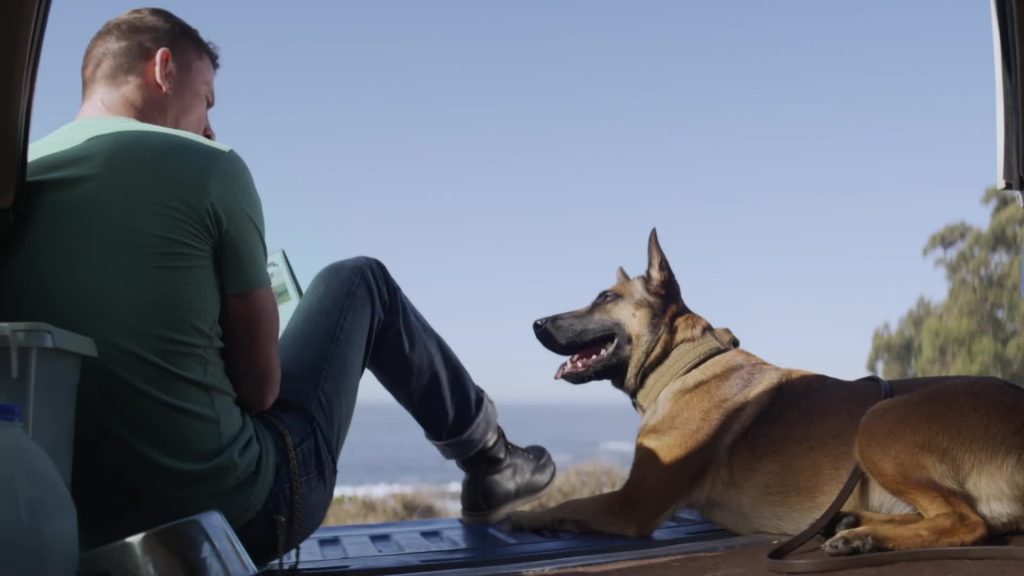

A well-executed telling with few surprises (and a few odd choices), Dog gives you pretty much the story that’s described on the can.
When a decommissioned army ranger with a chronic head injury, Briggs (Channing Tatum), agrees to do anything in order to get into the professional security game, he gets tasked with the unusual assignment of transporting a military-trained canine to the funeral of its recently deceased handler. Having experienced its own debilitating head injury, this will be Lulu’s last “assignment” before her own decommissioning — with a capital D.
As you might expect, the similarity between the injuries of man and beast is no accident and sets up for buddy story road trip structured around a series of parallels and second hand self-discoveries.
Lulu is a real piece of work: aggressive, anti-social, destructive, easily triggered. Briggs seems like just the opposite — pleasant, clever, a relatively well-adjusted good ol’ boy ex-soldier — on the surface at least.
Leashing up with Lulu forces him to confront how, deep down, they are a lot more alike than he wants to admit.
That’s the setup in a nutshell.
As they journey deeper south from Washington to Arizona and Briggs is forced to discover ways to deal with the escalating misbehavior of his animal companion, circumstances also prompt him to venture deeper into his own untamed interior places and seek out fresh ways to redress them.
So, for instance, when in a flush of sentiment Briggs decides to take a detour and reunite Lulu with one of her littermates before their final farewell, he also reunites with a fellow injured ex-ranger who has made more progress down the road of psychological integration. His buddy challenges him, nudges him towards trying to be more emotionally open towards therapy and friends, and sends him off with a promise that he’ll pray.
Here and elsewhere, the invitiation to Briggs is to become less martial, bestial and more social, personal. The grand irony in the telling, of course, is that his principle teacher is a dog.
Some viewers will probably find this completely plausibly, perhaps even touching, while others will roll their eyes. Can a human being really learn so much from a mutt unendowed with reason?
No matter what one might conclude out this film’s particular portrayal, in principle there does seem to be things we can learn about ourselves from our interactions with the animal kingdom. And as much in kind, perhaps, as by contrast.
As composite spiritual-physical beings, we humans are in a certain sense no less beasts than our animal brothers and sisters (to riff upon St. Francis). Have we not “hands, organs, dimensions, senses, affections, passions? Fed with the same food, hurt with the same weapons,” as Shylock inquires in The Merchant of Venice – all of which are attributes (to riff off one of my undergraduate professors) equally apply to our pet cats.
We are animal creatures, only we are also much more. Indeed, our tradition insists are designed not only to subsist amongst other animals as among equals, but also to exercise lordship over them while enjoying spiritual communion with other persons. While animals do have much to teach us about ourselves, then, even simply by being themselves, we are not seeing the big picture until we also recognize how much more we have to teach them, even as we learn from each other.
Interpreted generously, Dog does get us most of the way to these conclusions, I think, or at least to the threshold of flipping round to this “heads,” more interpersonal side of the human mystery.
There are a few odd choices in the film, as mentioned, among them relatively light-hearted forays into the territories of recreational drug use, tantric sexuality, and a consistent off-handed attitude towards lies and profanity like words just games one aims to get away with.
All this to say, the film has its flaws much like Briggs when we find him is probably not the sort of chap any of us ought really aspire to be. But by story’s end, we, along with Briggs and the help of his pup, do seem to be betting pretty close.
